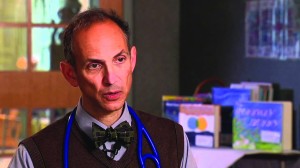
In some ways, Robert Needlman (YC ’81, YSM ’85) is the modern-day Benjamin Spock. Both men studied English at Yale, and both were interested in medicine alongside literature and language. As a pediatrician at MetroHealth Medical Center and a professor at Case Western Reserve University, Needlman is now tasked with updating the classic parenting book trusted by expectant mothers and fathers everywhere — “Dr. Spock’s Baby and Child Care.”
Benjamin Spock was a famous 20th century pediatrician who first published “Baby and Child Care” in 1946. It became the second best-selling book in America after the Bible, and is currently in its 9th edition. Needlman is similarly talented. He has found a way to combine his love of writing with his interest in science, primarily pediatric medicine. From an English degree to an MD, Needlman has demonstrated the value of a liberal arts background in the medical profession.
Needlman first began to work on Spock’s legacy by writing for drspock.com, a website that sparked his full-time commitment to thinking about the kinds of issues Spock used to write about, such as child developmental and behavioral disorders. Needlman went on to revise the 8th and 9th editions of Spock’s famous book, which contain updated sections on topics such as obesity and nutrition, environmental health, and immunizations. Parenting, according to Needlman, is a “moving target.” Thus, the book must be continually updated as new research and information about parenting surfaces.
Though some consider English and medicine distinct fields, Needlman sees an intuitive overlap. “What draws people to literature is that it is a way of understanding human experience. Medicine is also about appreciating and understanding the human experience,” Needlman said. He supposed that Spock might have been interested in development and child psychiatry for this same reason. “What was interesting to me about English literature was the stuff that dealt with how we got to be the way we are – how our experience shapes who we are,” Needlman added.

After graduating from Yale College, Needlman decided to attend the Yale School of Medicine. In his third year of medical school in 1984, he realized he wanted to be a pediatrician. Interacting with parents and children felt like a good fit to him, and he became emotionally invested in pediatric care. Though medical school was filled with all-nighters, Needlman delighted in attending lectures and learning about different parts of medicine.
After his residency and fellowship, Needlman began to work in developmental-behavioral pediatrics, a relatively new subspecialty within medicine. As physical disorders became less severe, doctors began to focus on more complex issues such as obesity and behavioral disorders. In addition to his work at MetroHealth and Case Western, Needlman recently gave workshops at a Developmental-Behavioral Pediatrics Review in Atlanta.
Throughout his successful trajectory in the field of medicine, Needlman continues to draw upon the lessons he learned at Yale, whether it is in taking care of patients, teaching, or working with colleagues. “The best of a Yale education, I’m convinced, is your classmates,” Needlman reflected. He advises current students that relationships with professors are important, but relationships with peers are indispensable. “Delve wholeheartedly into your experience. Going to a place like Yale is really a privilege. It is worth keeping that in mind,” said Needlman. Living up to the privilege of a Yale education is exactly what Robert Needlman has done for himself — understanding humanity in the earliest stages of life.
